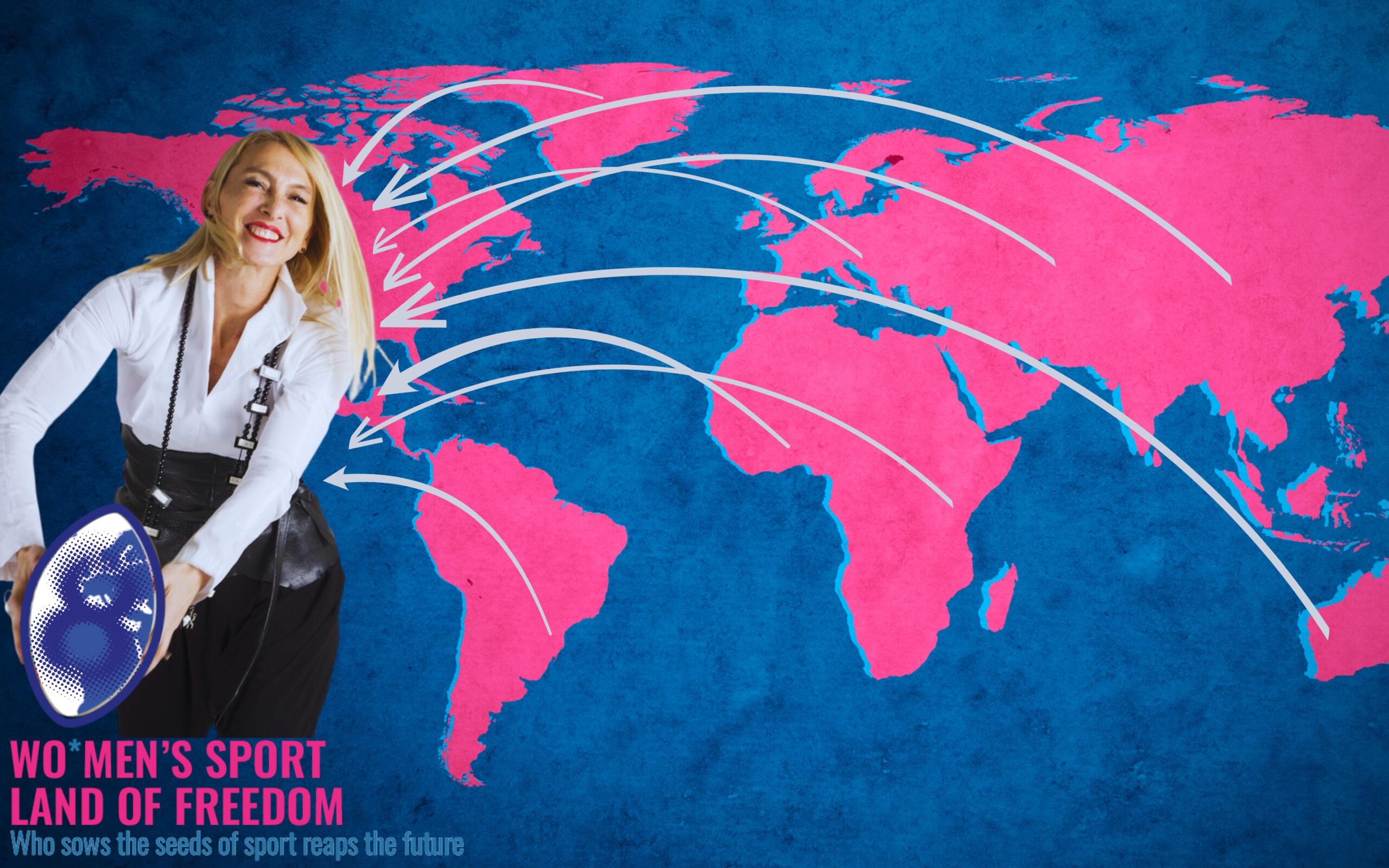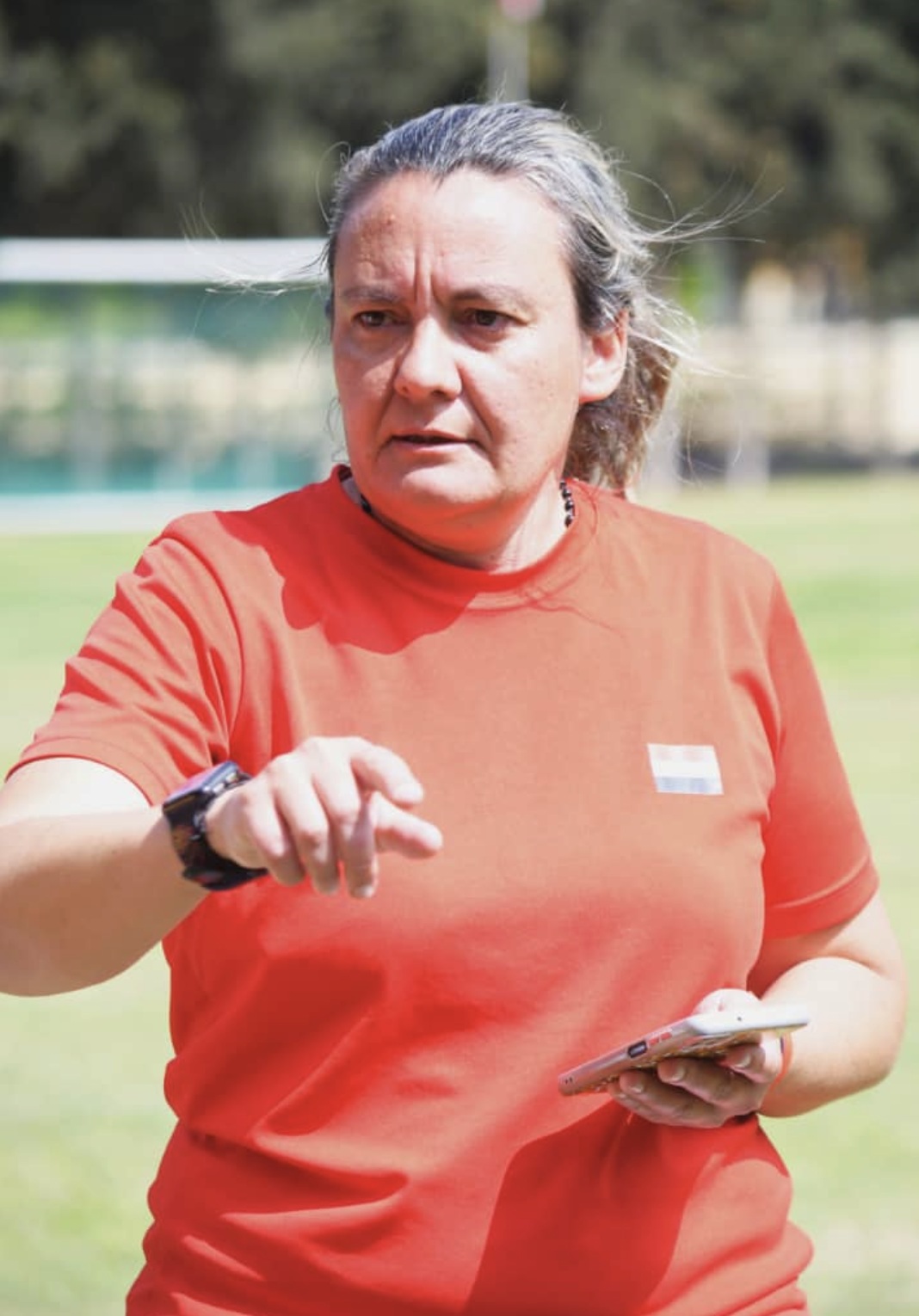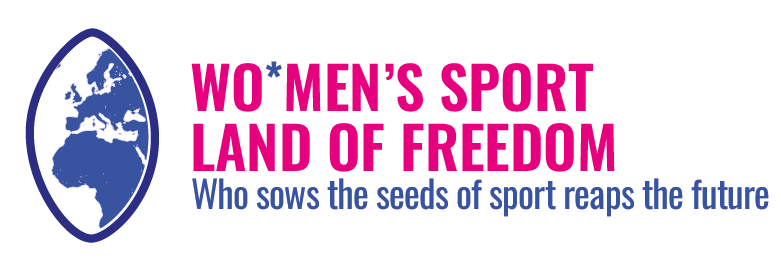
ARGENTINA: PLAYING RUGBY GIVES YOU MUCH MORE CONFIDENCE IN LIFE
“Playing rugby gives you much more confidence in life”

Thanks to:
Carolina Bravo
Former Women’s Development Officer at the Argentine Rugby Union. Former coach of the women’s national team of the Syrian Arab Republic.
- The history of the women’s movement in Argentina
- Testimonials
- Reading time: 10 minutes
ARGENTINA - Find out more
Argentina is a federal republic and presidential democracy in South America, with about 45.85 million inhabitants in 2025, slightly more women (around 50.5%). Women hold just over 40% of the seats in Parliament (both the Chamber of Deputies and the Senate), thanks in part to a structured legislative policy of gender parity on electoral lists. Women’s labor‑force participation is 52.9%, compared to 71.8% for men. Demographically, the population is characterized by a median age of about 33, a high level of urbanization (over 90%), and a 15–64 age group composed of almost 65% women. In addition, around 80% of women of reproductive age have met their need for family planning with modern methods, yet disparities persist in unpaid domestic work and there are significant data gaps on the pay gap and gender‑based violence, despite a solid regulatory framework.
(SOURCE: Worldometer; Statisticstimes.com; World Bank Gender Data Portal; TheGlobalEconomy.com; data.unwomen.org; IPU Parline; Freedom House; DataReportal Argentina demographic; CEIC; Wikipedia — Gender quotas)
HISTORY OF THE COUNTRY
1. When did the women’s rugby movement start in your country and what is its history? How is rugby structured in your country?
The Unión Argentina de Rugby (UAR) is made up of 25 provincial unions and is divided into 8 regions. In Argentina, women’s rugby has a history of over 25 years. The first match (in the XV format) was played between GEI (Ituzaingó) and ALUMNI, both clubs belonging to the Buenos Aires Rugby Union (URBA). It was played on 25 November 1985, but it took 11 more years for Cha Roga Club of Santo Tomé, Santa Fe (Santa Fe Rugby Union) to appear in 1996. In 2004, the Argentine Rugby Union officially recognized rugby played by registered women, which spurred the creation of more and more teams in clubs affiliated with the provincial unions, to the point that today women’s rugby is present across all provincial unions. Physical Education teachers around the country played a key role in developing players, with rugby included in the training curriculum for future teachers. They became true talent nurseries. A few examples: In 2003, in Bahía Blanca, at Physical Education Institute No. 86, the southernmost women’s team in the world (at that time) was formed, made up of students under the name Malen Rugby, led by Professor Carlos Burgos. In the north, at the Faculty of Physical Education in Tucumán, the Huarmis emerged under Professor Fernando Erimbaue. The provinces of Corrientes and Chaco also formed teams with their own teachers. In Buenos Aires, at the “Romero Brets” Institute, the Ñandú were born, led by Professor Yanqui Braceras. In 2010 the UAR asked all “satellite” teams created around training institutes to affiliate with clubs already belonging to the provincial unions. In this way, women began to be visible on the various club rugby fields. The “player + Physical Education teacher” formula became synonymous with youth category coaching, thanks to pedagogical training, knowledge of the game and playing experience. Women thus became trainers and reference points for girls who began to see rugby as a sport they could approach.
Today, all provincial unions have developed women’s rugby to a high degree within their affiliated clubs. At the beginning, only friendly matches were played in Argentina and the format was agreed between coaches based on numbers available. With rugby’s inclusion in the Olympics, sevens took root, bringing regulation to competitions at local, regional and national levels, where the top two teams in each region face off in Senior and Youth categories. Currently there are 1,001 youth players and 2,621 seniors, for a total of 3,622 registered athletes.
For 40 years the UAR has organized the prestigious “Seven de la República” tournament for men’s provincial selections, and in 2017 it added senior women’s selections and later youth selections. This created a larger competitive calendar for the women’s game. Although there is still a way to go, great progress has been made: being part of such a prestigious competition has been a major achievement for women’s rugby in the country. Over the years, rugby women have also taken on highly significant roles off the field: as youth coaches, referees, senior team managers, executives and representatives in provincial unions, head coaches of first teams, provincial and national selections, strength and conditioning coaches and physiotherapists. Only in 2017/2018 was there a Women’s Development Manager at the Argentine Rugby Union. In Argentina, women’s rugby is present in Senior, Youth and also Mixed Mini rugby categories. More and more girls are choosing this sport… The paradigm is changing. In 2004, under the name Las Pumas, the first Women’s National Rugby Team was formed with the aim of participating in the first South American Championship in Venezuela, organized by Sudamérica Rugby. From that year on, Argentina has taken part in every South American edition without interruption, always among the continent’s top three teams alongside Brazil and Colombia. Notably, Argentina are the current South American champions. The team currently competes in the World Rugby Sevens Challenger, but has not yet qualified for the Olympic Games. In 2022, the National Team sought its own identity to differentiate itself from the men’s nickname “Los Pumas,” choosing the jaguar and its representative traits. Thus a new identity was born: Las Yaguaretés.
2. Do you think playing rugby has a social impact for a woman in your country?
Argentine women in rugby—gradually but decisively—have grown and continue to grow. The new paradigm—women’s empowerment through rugby—represents one of humanity’s most tangible advances in sport: it challenges us as a society. Rugby profoundly impacts every woman who has played even once or who works in spaces connected to the sport. In the game as in life, everything rests on decision making, conviction and passion. Without passion, nothing is achieved: it would be just a game, but rugby goes further—it is our way of living, breathing and seeing life. Alone or as a team we move forward, goal focused; we feel free; we value and accept our bodies. We are visceral in our actions, determined and sure of what we want. We simply want to play rugby; we choose it; we accept its rules and respect them. We grow as people, we awaken a sense of belonging, we defend the jersey, we defend the first jersey we wear when we are born—our skin, our blood, our DNA. We represent our families on and off the field; the values taught at home we promote and pass on. We understand rugby as a legacy and we transmit it to future generations. Self esteem flows. We are free and empathetic; we are daughters, mothers, partners; we are athletes; we are women; we are mirrors and empathetic. Rugby has marked us forever and we want all future generations in the world to know this noble, generous sport. Today no one can ignore that it is a fundamental tool for the integral development of women—the results are very visible. My passion for social and community rugby in developing areas recently took me to Syria, where I coached the women’s national team. It was both a professional and personal challenge. I had never been to Syria, nor any Arab country. Besides coaching the National Team and successfully leading them to compete in the Arab Rugby Sevens Tournament held in the UAE, I designed and implemented a short and medium term development plan. I visited schools, kindergartens, sports clubs and other public and private institutions, multiplying the visibility of our sport in a short time and laying the foundations for the development and expansion of women’s rugby in Syria—working closely with Syrian authorities. Given the country’s difficult circumstances in recent years, rugby takes on its full meaning as a tool for women’s inclusion in society. Working in this context enriched me greatly, personally and professionally. I experienced social and community rugby from the inside in very different environments, managing to adapt easily, to teach and also to learn. Expressions like “I felt free for the first time,” “Now training is worth it” (first time with a foreign woman coach), “I want this for my life,” “Thank you for teaching me to bring order to my life”—these arose during my coaching experience in that Arab country and remain engraved in my mind.
“ARGENTINE WOMEN LEADERS” – contributions
Gisela Acuña, former Puma, Santa Fe Rugby Union leader, pioneer of women’s rugby in Argentina, coordinator of Cha Roga Club (Santo Tomé, Santa Fe), former youth national team coach:
“First of all, I am the woman I am today because of what I lived in and for rugby. I discovered this sport in 1996 and fell in love with it like a young girl in love. My teenage years were quite turbulent, and it was at the rugby club that I found calm for my emotional upheavals. And I am still in love with rugby—with the game and with on field experiences—as a player, a referee, a coach, an assistant coach, in any role that takes me back to that patch of grass that makes me feel free and fills me with love and peace. I’m still in love in 2025, after maturing through things, overcoming discriminatory storms and contempt for my gender. Those wounds, which I carry on my heart and skin, remind me who I was, who matured and grew into a person who today is proud—despite tears of sadness or joy—to be disciplined, respectful, honest, hardworking and passionate. Thank you to rugby for finding me, and to life for letting me find rugby… Rugby made us stronger than we were; it pushed us to believe in ourselves and in our abilities… Rugby makes women more than athletes; it makes them good people, with the strength to work for the common good, to be supportive teammates… It offers women a space where everything is to be built, to offer a different gaze—neither better nor worse—just different. And it is precisely that difference that will make rugby grow in its entirety, because we all look toward the same goal: the growth and expansion of our sport to all humanity.”
Sara James, pioneer of women’s rugby in URVCH, founder of the women’s team at Draig Goch RC–Gaiman, Trelew (Chubut), now OPD and RF leader of the Chubut Valley Rugby Union:
“Rugby is a way of life… If I think about the sport’s philosophy, it’s the one that marked me most with its values: respect, teamwork, discipline, the importance of fair play, respect for the opponent, referee and teammates. It introduced me to so many people across the country. Loyalty without limits… Just as it influenced my life 19 years ago, it does the same with every woman who approaches, tries and stays in the sport. A sport for everyone. Women in leadership roles—coaches, players, mothers who inspire—make Rugby great… Keeping its spirit, philosophy and values alive is a constant task. Being part of that and committing to it is a great responsibility.”
Luciana Fonzo, manager of Old Resian Club (Rosario) and of the Rosario Rugby Union selection, Santa Fe:
“Rugby—a starting point to open horizons. My role is in management, as a MANAGER, a place that lets me live closely with the players, know their stories and dreams, build visions, handle kits, fields, third halves, bags, water, even care for children, so these women can focus on training and playing… Rugby for women is a chance to grow, to set goals, to belong to a passion, to boost self esteem because ‘it’s possible,’ to conquer spaces once exclusively male, to form a group, learn to negotiate, unite individual goals into a shared goal, learn to fall, get up and keep going, to trust the person beside you, to dare to dream, to always move forward, to expand the horizon of possibilities, to light the inner fire and want to go further… We have seen how, regardless of age or economic, social or cultural conditions, those who begin and continue in the game grow, transform, take courage, feel their limits expand and that they can achieve more. This carries over to personal life: courage, confidence and the certainty that if you dream and work hard with discipline and commitment, those dreams come true.”
Ana Pacheco, manager of men’s categories at Catamarca Rugby Club, women’s rugby coordinator in the Andean Rugby Union (La Rioja and Catamarca):
“Rugby is incredibly complete, both athletically and socially. It positively influences women by offering wide possibilities for inclusion, breaking down barriers and stereotypes and contributing to gender equality. Rugby is life itself; it gives you the tools to overcome any adversity with strength. It helps forge self esteem, confidence, discipline and perseverance that reflect teamwork. Respect and loyalty create lifelong friendships.”
Stories have no borders, emotions are universal and—as empowered women—we are bridges between cultures. Women bring unique experiences, emotions and perspectives that enrich the sport in ways we cannot measure but can live and transmit. It is not just about numbers, but about normalizing equality. The aim is not to celebrate women’s “mission” as something extraordinary, but to normalize in the world’s eyes the presence of women in rugby, in all their roles—far beyond that of player. In this way, Argentina has turned the page on women’s empowerment in rugby.
JOURNEYS THROUGH RUGBY (Carolina Bravo)
1. When did you start playing rugby and how you discover it?
From the moment I discovered it, my life became oval. (…) It’s the fuel of my life—and it always will be.
2. What has rugby taught you that has impacted your daily life? Can you give me an example of when a rugby mindset was useful?
Playing rugby gives you much more confidence in life. (…) Women feel more empowered. (…) They feel stronger, which can open new social possibilities. (…) When a woman plays, she feels much more self assured. The rugby mindset translated into active listening, leadership and cultural change on the field. As national coordinator, visiting the unions… I spoke with and listened a lot to players on one side and coaches on the other. (…) I coached and trained coaches. (…) The question was: how do you coach a woman in rugby?
3. Can you give me 3 words that connect rugby to freedom?
Passion: You must always be passionate about your convictions.
Energy: Passion, convictions and energy.
Being yourself: It’s the place where you feel whole. (…) Stepping onto the field is where you are yourself—it’s your essence.
4. What does live in a land of freedom mean to you?
Women… playing rugby gives you much more confidence in life. (…) It has a cultural impact. (…) We women have a real impact on society and culture. Freedom is expression, cultural impact and inner security.
5. What object represents you and why? What is an aphorism that guides your life?
An object that represents me? Obviously the oval. (…) The rugby ball. (…) I genuinely feel it as a heart that beats constantly in my life. I have several… but there is one I love. It sums everything up: “Believing is creating.” And you must always be passionate about your convictions. When those are clear, they help others join you in the same goal.
